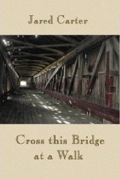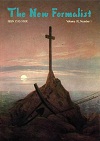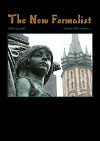Steel Masks
King Henri II of France was accidentally killed in 1559 during a festive tournament when he was lanced in the eye by Gabriel Montgomery, seigneur de Lorges, a member of his Garde Ecossaise. A young Italian nobleman named Luigi Corbinelli witnessed the event, and was so profoundly moved by it that he renounced the world and joined the Jesuit order.
The swirling pomp of ceremony, gold
And ermine, banners blazoned in vermilion—
Heraldic pennants waving in the sun
Float high above the lists and the pavilions.
The wedding day of France’s royal daughter
Has packed Parisian streets with festive throngs,
While clanking weapons and the thrum of lutes
Contend with trumpets, bells, and brazen gongs.
The king is flushed, ebullient, in his prime—
A monarch at the pinnacle of pride.
His every gesture summons from the crowd
A roar of hoarse approval. Then there rides
Montgomery to the joust. His face is masked
In gleaming steel; he holds his ribboned lance
Level and ready for the playful tilt.
The lords and commons cheer as horses prance.
The Scotsman’s lance-tip glances off the shield
King Henri holds at some ill-fated angle
And drives right through his visor. In one pass
The king is dead, his brains a bloody tangle.
A shock runs through the city, and then France,
Where death has entered like a silent thief.
A young Italian noble who had come
To take part in this wedding-turned-to-grief
Is stricken to the core. He cannot sleep.
All food is tasteless, every pleasure nil.
He thinks of Henri, vigorous and fit,
Dead for a silly, momentary thrill.
Returning home to Florence, he then deeds
All rights in his estate to a relation,
Presents himself to the Ignatian Order.
When asked, he gives this simple explanation:
“I saw King Henri speared straight through his mask
Of iron, by another masked in steel.
And at that moment I saw through the sham
Of life, and how it hides us from the Real.
We think our vizards tempered, well-wrought, proof—
But they are brittle masks that cannot blunt
The thrust that sends us down to that cold realm
For which life is a flimsy, pasteboard front.
Suicide Bomber
A jacket packed with gelignite sewn in
With carpet nails, ball bearings, shards of glass—
Two detonator caps and striking pin
Taped to his back, and wired up to pass
Beneath his groin, while resting in his pocket
A simple circuit switch awaits his thumb.
Around his neck, he wears a golden locket
That holds a sacred text of life to come.
He thinks of peoples, nations, tribes, and races—
Those networks of identity and rage:
The fallen friends, the unavenged, whose faces
Gaze and applaud as if he were on stage.
And yet it’s he who triggers—all alone—
The flame-red sunburst of his blood and bone.
Time Capsule
We filled it with the icons of this age:
A cellphone, condoms, iPod, and a beeper;
Viagra, vitamins, a sample page
Of cable TV listings, and the cheaper
Sort of costume jewelry. As for print,
A copy of the Sunday New York Times;
And just to give posterity a hint
Of grittiness, a list of all the crimes
Committed in the course of this past year;
The names of several starlets and their diets;
An advertisement for our home-brewed beer
And CDs of the latest urban riots.
So down it went, to wait for resurrection,
When how we lived shall come up for inspection.



